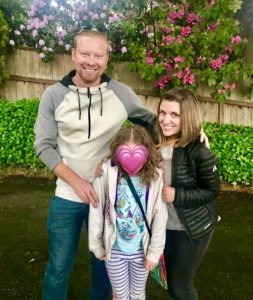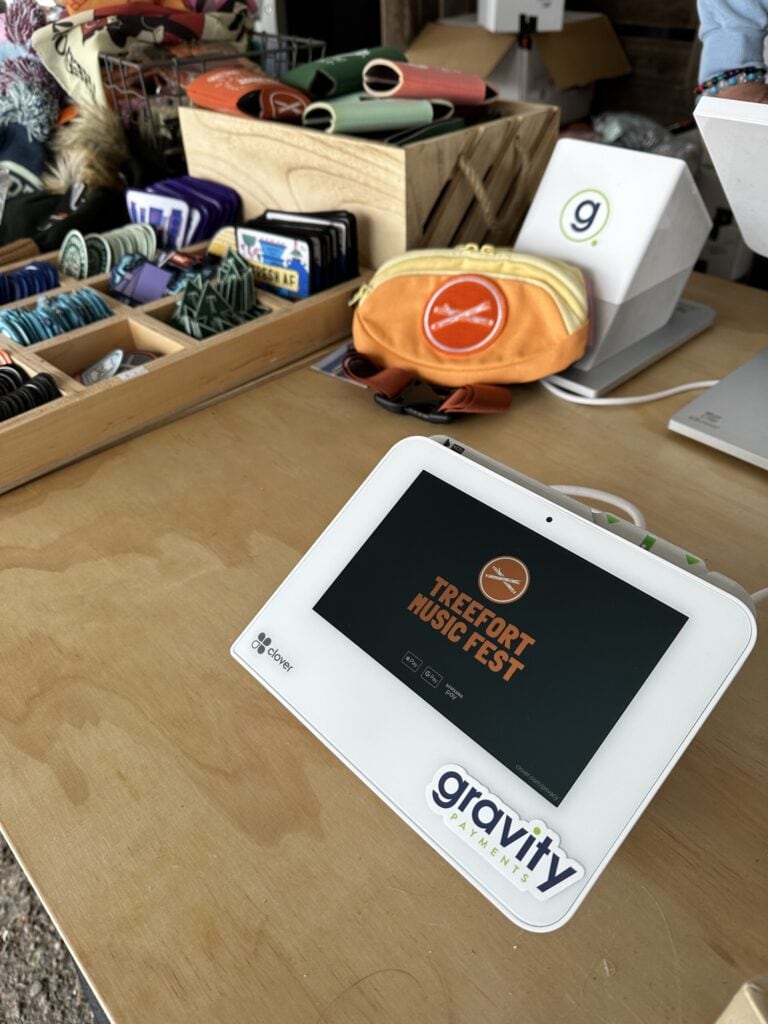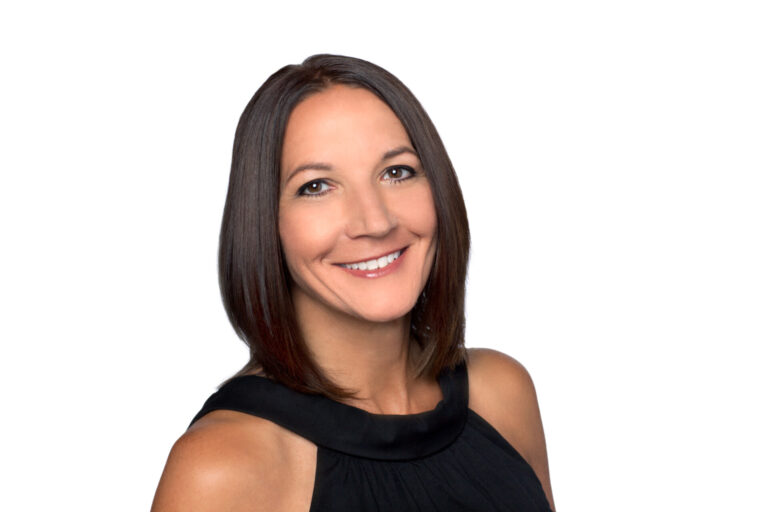For Tanya Williamson, the decision to become a foster parent was not a choice but a calling.
Her passion for helping at-risk youth began back in college when she worked as a volunteer at a summer program for kids about to enter their first year of high school. The drop-out rate for high-school students in Portland, Oregon, (where Tanya lives) is 50 percent, so the program’s goal was to encourage these students to graduate. “The whole idea was to spend time with them and take them to colleges, and to visit businesses, and give them hope and desire to finish high school,” Tanya says.

Jeff and Tanya Williamson with their foster daughter.
Born and raised in the affluent area of West Portland, Tanya grew up in a comfortable, stable household and enjoyed privileges–like annual family trips to Disneyland–she took for granted. It wasn’t until she began working at the program when she realized the reason so many kids drop out of school has less to do with desire and more to do with circumstances well beyond her control.
“I was trying to help them understand over the summer that finishing school is a good thing to do,” she says. “And I’m finding out that this thirteen-year-old boy is caring for his four siblings because his single parent works full time. He doesn’t have the capacity to even think of school, let alone go to school, because he’s caring for his siblings. That was a culture shock to me. I had a lot of these kids bash me the first few weeks of that program. They were saying, ‘Hey, you’re a white chick from the west side. You have no idea what our lives are like. Just telling us to finish high school and just try is not something that you understand and is easy to do.’”
Still, Tanya knew there had to be a better way to impact these kids’ lives. She had to believe there was hope for them and was determined to provide it. “One of the things I learned in the program was that, statistically, you can have two kids that grow up in the same situation–single parent, maybe alcohol, lots of kids, struggles, poverty–and one makes it and succeeds in life and totally goes down a different trajectory, and then the other one just continues the cycle of what they grew up in.” The difference? The kids who break the cycle have at least one person in their lives–a coach, a teacher, a mentor, or someone else–who gave them hope and encouraged them to reach their potential.
This stat stuck with Tanya for a few years, but she became even more motivated to get involved after having a series of bad dreams that convinced her she had to act. “I started having these nightmares about kids that were either being abused or struggling or didn’t have food,” she says. The dreams lasted for about a month, and she couldn’t figure out why her brain was filled with such horrible images. Finally, she turned to her faith to help sort it out. “I really prayed through that time a lot, asking why is this happening? Why can’t this go away? All I really felt–and it’s hard to explain to someone if you don’t have a relationship with Jesus or the Holy Spirit–but there’s just promptings. And all I could sense or hear over and over again was, ‘Yeah, do something about it. So, do something about it. Help these kids. I need you to do something.’”
Tanya started doing research and discovered a Christian-based organization called Faithful Friends that matches volunteers with young people dealing with poverty, neglect, or other difficult circumstances. Each week, mentors meet with their mentees for a few hours and take them to do things they might not otherwise have a chance to do–like eating out, going to a movie, or taking a trip to the beach. Each volunteer must commit to at least one year working with the kid they’re assigned so as to provide a sense of stability and commitment for a child who may not receive a lot of one-on-one attention at home.
“The goal of the program is to let kids be kids,” Tanya says. “Because a lot of the kids that come into that program are unable to be kids. They’re in circumstances where they’re kind of surviving, or they’re taking care of other siblings and playing the adult role. They have stresses and fears on them that other kids don’t typically have to deal with, so really it’s giving them a break from their normal life.”
Tanya and her husband Jeff joined the program in 2016 and were paired with a six-year-old girl whom they still mentor to this day. Since then, they’ve also become close to the girl’s family, including her siblings and mom. “Every week my husband and I pick up our mentee and take her to do really fun things, and it just rips your heart out as a mentor because you just want to take all the siblings, too,” Tanya says. “That kind of defeats the purpose, though, of giving the one kiddo that undivided attention and letting them hang out with you on their own. But over time we would start to take her sister or her brother, or we would decide to go up and be in the apartment with all the kids there. In their situation in particular, the kids are on their own a lot, so it kind of just naturally progressed to just being with her to then getting to know the other kids, then watching them and eventually building a relationship with the mom.”
Get the Gravity newsletter for the latest FAQs, tools, tips and tricks
Just like the program she did in college, the experience of getting to know this family has helped Tanya understand just how different some kids’ circumstances are from her own.
“When we first started meeting with [this girl], I would ask questions that I didn’t realize were questions I shouldn’t ask, like, ‘Where do you like to go out to eat?’ or ‘What do you like to do?’ For these kids it’s, ‘We don’t go out to eat and we don’t do anything, so I don’t know what I like because my family can’t afford those things,’ or ‘that’s just not the life that I live.’”
Tanya and Jeff have no plans to stop mentoring this girl anytime soon. But, about a year and a half ago, Tanya began to feel like she needed to do more. “Through the work with Faithful Friends and really being exposed to kids in tough situations over those years, I started feeling that the Lord was prompting us to take that work further.”
She and Jeff began to consider fostering as an option but were initially apprehensive of the commitment involved. They knew that many of the children who go into the foster system come from extremely troubled backgrounds and that the experience of moving through foster care can exacerbate existing traumas. Were they capable of caring for and loving one of these children the way they needed to be loved and cared for? They knew that if they became foster parents, they would have to commit to it for the long haul. When things got hard–which they certainly would–they’d need to be able to handle it. Backing out and abandoning a child who was already suffering was not an option.

A few of the special touches the Williamsons added to their foster daughter’s bedroom.

After praying on it for a few months, Tanya and Jeff determined that fostering was part of God’s plan for them. In September of 2018, they began the process to become certified. Although the certification process was intense, Tanya says she was glad to know the state put so much effort into vetting potential parents. “I think there’s a lot of horror stories about foster families and what happens to foster kids. So it was really actually nice to see how rigorous the certification process was.”
After eight months, the couple received their certification and were cleared to start fostering. They were placed with a nine-year-old girl after requesting a child in the six-to-twelve age range. “We really felt passionate about older kids,” Tanya says. “Which is the hardest age to take because they generally come with a lot of trauma and challenges.”
Although she can’t disclose the details of the girl’s situation, she describes them as “sad.” The girl was also new to the foster system, having lived with her mother up until last year when she was placed with another foster family who helped her adjust to life outside of her family home. The girl began meeting with Tanya and Jeff in April and officially moved in with them on Mother’s Day weekend.
Although the transition has been relatively smooth, it’s also been extremely challenging, not least of all because Tanya and Jeff have never cared for a child full time. “I think that a lot of people that go into fostering were parents before, so for my husband and I it was like a double whammy. We’ve never been parents, and we’re deciding to parent a foster kid for our first time parenting.”
One of the biggest adjustments has involved the amount of time Tanya and Jeff have to themselves. “Jeff and I have been together for almost fifteen years,” Tanya says. “We have lived a really fun life. We love our date nights. We lived in the city for seven years, and now we live on a lake outside of Portland. We enjoy being spontaneous, and just heading to the coast for the weekend or going out to dinner, so it’s been a big transition for us. We’ve gone on four date nights in ten weeks when normally we would be going out three times a week.”
Luckily, they’re not making this transition alone. “You always try to create a team around the foster kid,” Tanya explains. “She has her therapist and other people to help her given that she’ll have a lot of processing to do in regards to understanding her situation and why she’s in foster care and the anger that she’ll feel at times. She does trust us a lot. The foster family she was with before had four other kids, so here it’s just her and my husband and I so she gets undivided attention, which I think is good for her. The caseworker, her attorney, and her therapist all say that they have never seen her this happy and comfortable before, so that’s positive.”
Still, they have a long way to go before everyone fully adjusts to their new living situation. “Ultimately, kids want to be with their family; they don’t want to be in foster care,” Tanya says. “It’s hard for them to understand why they can’t be with their family, especially if they’re not told about all the things that their parents were dealing with.”
In order to help settle her kiddo in some more, Tanya decided to take some time away from work this summer to spend quality time with her. “There’s lots of camps for foster kids and resources for them in the summer, but I just really started to feel like God was asking me specifically to take time off to bond with her because she was dealing with a transition, number one, to our house from this other family that she was with for a year that she cared a lot about. And her mom is doing some things lately that are really hurtful, so she’s processing that. I just really started to feel like I needed to be with her this summer.”
It was the right decision. “She’s been telling everybody that next summer I’m going to have a really boring summer–me personally–because I’m going to be working again. This is a special summer where we get to spend this time together, but next summer will look different.”
Despite the challenges, Tanya is confident that she made the right decision by choosing to foster. Still, she urges others interested in fostering to proceed with caution. “You cannot be going into this work for any self-gratification or joy or expectations of getting something out of it in return because you will sacrificially and unconditionally love and give everything to this kid, and they will ultimately still always want to be with their parent,” she says. “You can expect nothing in return. People need to really analyze and dig deep into why they want to do this work before making a decision. If they’re like, ‘I’m going to do this work because it’s just the right thing to do, and I’m going to get joy out of doing it,’ ‘it’s probably not the right decision for them because it’s hard. You’re going to deal with, ‘You’re not my mom, I don’t have to listen to you.’ You’re going to deal with the outbursts and rage, and you’re going to deal with trauma that kids have gone through that comes out in different ways in your home. So, it’s not for someone who’s weak or who’s looking for something for themselves. You have to be strong and not have expectations or be looking to get anything for yourself, which most people, I think, have a hard time doing.”
Written by Brooke Carey, Lead Storyteller
Humans of Gravity is a profile series designed to highlight the unique individuals who comprise our team. Gravity Payments believes in celebrating our shared humanity by letting employees bring their full selves to work. Interested in joining this amazing group of people? Check out our Careers page for the latest opportunities.



